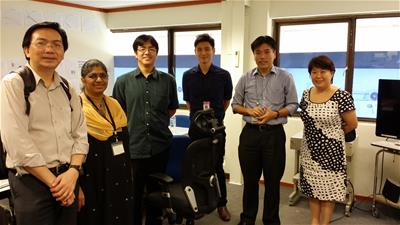Agile lessons come to life for two ISS Graduate Diploma student undergoing internship at the electronics giant, as it introduces the Scrum approach to software development.
Philips is a world leader in product line engineering, and a recent advocate of Agile methodologies in software development. Two students from the ISS’ Graduate Diploma in Systems Analysis programme were given a four-month internship stint with the team responsible for the iOS application behind Philip’s new InRange Bluetooth Smart Leash, an app-enabled device that alerts users when they leave personal valuables such as wallets or keys behind.
“Our management had gamely supported the effort by setting up a dedicated Scrum room so we could expedite results,” said the Philips Singapore’s Software Section Manager, who was also in charge of supervising the ISS interns.
Scrum turned out to be an effective enabler for the project development team, who discovered an improved process for presenting demos to the marketing department earlier and more frequently. This has allowed them to anticipate changes in advance and reduce the number of corrective actions required at later stages.

The Scrum team at Philps with NUS-ISS staff
As Scrum promoted strong focus on the team, a sense of bonding and ownership was quickly fostered, and every member’s contribution towards final delivery, was acknowledged and respected – including the efforts by the two ISS interns.
“As both Lakshita and Su Yee came on board at the start of our project, they were treated just like one of us, growing and learning together as a team as the work unfolded. Team members also took turns to mentor and offer guidance as and when required, and both interns came well trained, and it took just one to two Sprints before they got used to the way Scrum was practiced.”
He was pleased that the interns understood their assignments, and could make the most of their exposure and responsibilities in getting tasks from the Sprint backlog and managing their own deadlines for activities. He observed that both worked extremely well with their peers, and established good relationships quickly with all members in the team.
Aided by the opportunity for cross learning, the team was able to deliver and commit to more with the interns on board. “While we imparted our experiences and skills, both Lakshita and Su Yee brought fresh perspectives as well as new and updated theoretical concepts that they’ve learned at school.”
Sharing the interns’ side of the story was Lakshita, who was involved in user experience (UX) development, memory optimisation and stability, testing, designing, implementation, and preparing design documents and test cases.
“I got to practice all the basics of Agile methodologies taught at ISS. Besides, the chance to act as Daily Scrum Lead on a rotational basis provided me with real lessons about committing to tasks from the Sprint board, plotting Burndown charts, calculating total man hours and velocity for estimation, preparing the Scrum board based on Sprint backlog, and contributing to the tasks in it,” Lakshita recalled enthusiastically.
“Our lecturers have equipped us well with knowledge about Scrum, XP and Pair programming, and I’m quite familiar with Scrum activities like creating a product backlog, going through Sprint cycles and delivering a shippable product, and understood the importance of test-driven development and continuous integration approaches.
“However, the internship with Philips truly gave me a chance to apply what I’ve learned, and participate and contribute to a real project. The practical experience, and the opportunity to assume the roles and responsibilities of being a Scrum team member have been invaluable,” Lakshita added.
This article is first published in NUS-ISS quarterly e-newsletter, Issue 6 (Apr-Jun 2014).